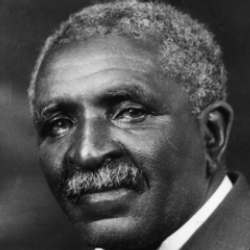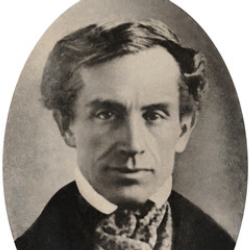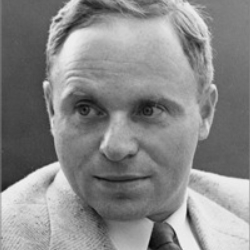James D. Watson Quotations
James D. Watson Quotes about:
-
Born Quotes
If someone's liver doesn't work, we blame it on the genes; if someone's brain doesn't work properly, we blame the school. It's actually more humane to think of the condition as genetic. For instance, you don't want to say that someone is born unpleasant, but sometimes that might be true.
-
Born Quotes
I was always very curious about what a scientist's life was like when I was young. Of course, when I was young, you didn't have very many opportunities to find out with no web, TV. I was very lucky: I was born in the city of Chicago and went to the University of Chicago where I actually saw things.
-
Bacteria Quotes
Here at the Cold Spring Harbor Laboratory, we have genetically rearranged various viruses and bacteria as part of our medical research. In fact, we have been able to create entirely new types of DNA molecules by splicing together the genetic information from different organisms - recombinant DNA.
-
-
-
Levels Quotes
The ever quickening advances of science made possible by the success of the Human Genome Project will also soon let us see the essences of mental disease. Only after we understand them at the genetic level can we rationally seek out appropriate therapies for such illnesses as schizophrenia and bipolar disease.
-
-
-
Boys Quotes
As a child, I lived with being punier than other boys in class. The only consolation was my parents' empathy - they encouraged constant trips to the local drugstore for chocolate milk shakes to fatten me up. The shakes made me happy, but still, all through grammar school, other kids shoved me around.
-
-
-
-
-
-
-
-
-
-
-
-
-
-
-
-
-
-
Assume Quotes
If we could honestly promise young couples that we knew how to give them offspring with superior character, why should we assume they would decline? Common sense tells us that if scientists find ways to greatly improve human capabilities, there will no stopping the public from happily seizing them.
-
Animal Quotes
I have an odd theory on happiness, and it bothers people. My general theory is that happiness is a reward for an animal doing what it should be doing. So if a horse runs, it feels happy. Or if you are too thin, you can't be happy, because evolution wants you to be tense and anxious, trying to wake up in the morning looking for food.
-
-
-
-
Clear Quotes
My parents made it clear that I should never display even the slightest disrespect to individuals who had the power to let me skip a half grade or move into more challenging classes. While it was all right for me to know more about a topic than my sixth-grade teacher had ever learned, questioning her facts could only lead to trouble.
-
-
-
-
-
-
Deciding Quotes
I started doing science when I was effectively 20, a graduate student of Salvador Luria at Indiana University. And that was - you know, it took me about two years, you know, being a graduate student with Luria deciding I wanted to find the structure of DNA; that is, DNA was going to be my objective.
-
Contains Quotes
An idea can be tested, whereas if you have no idea, nothing can be tested and you don't understand anything. The molecule that you make when you are getting sunburned or when you eat a lot of food is part of the same molecule that contains an endorphin or an opiate. No one has ever had a hypothesis about why the two are together.
-
-
-
-
-
-
-
-
-
-
-
-
-
-
-
-
-
-
-
-
-
-
-
-
-
-
-
-
-
-
Law Quotes
I'm basically a libertarian. I don't want to restrict anyone from doing anything unless it's going to harm me. I don't want [to] pass a law stopping someone from smoking. It's just too dangerous. You lose the concept of a free society. Since we are genetically so diverse and our brains are so different, we're going to have different aspirations.
-
-
-
-
-
-
-
-
-
-
-
Lonely Quotes
I recently went to my staircase at Clare College, Cambridge and there were women there! There have been a lot of convincing studies recently about the loss of productivity in the Western male. It may be that entertainment culture now is so engaging that it keeps people satisfied. We didn't have that. Science was much more fun than listening to the radio. When you are 16 or 17 and in that inherently semi-lonely period when you are deciding whether to be an intellectual, many now don't bother.
-
-
-
-
-
-
-
-
-
Humanity Quotes
There is no firm reason to anticipate that the intellectual capacities of peoples geographically separated in their evolution should prove to have evolved identically. Our wanting to reserve equal powers of reason as some universal heritage of humanity will not be enough to make it so.
-
-
Motivational Quotes
Remember, grab you're future with both hands and mold it into what you want it to be. It's the determined, who create the life they want, while the idle sit by and watch it fade away into nothingness. The future belongs to the exceptional individuals, who can see the light of the future, at the end of the tunnel.
-
-
-
-
-
-
-
Father Quotes
One of the greatest gifts science has brought to the world is continuing elimination of the supernatural, and it was a lesson that my father passed on to me, that knowledge liberates mankind from superstition. We can live our lives without the constant fear that we have offended this or that deity who must be placated by incantation or sacrifice, or that we are at the mercy of devils or the Fates. With increasing knowledge, the intellectual darkness that surrounds us is illuminated and we learn more of the beauty and wonder of the natural world.
-
-
Accept Quotes
I do think one success of Northern Europe, which the United States came from, was its willingness to accept innovation in business practices like Adam Smith and the whole Enlightenment. It essentially made the merchant class free instead of controlled by the king and aristocracy. That was essential.












